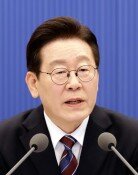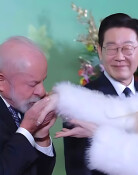[Editorial] Perspective for inter-Korean question
[Editorial] Perspective for inter-Korean question
Posted July. 15, 2000 15:06,
Nowadays, just one month after the June 15 inter-Korean Declaration, the national situation is heading toward delicate complications and confrontation not only between South and North Koreas but also between the ruling and opposition camps, thus the pan-national question is developing into untoward direction. Accordingly, it is feared that the grand cause for the hoped-for inter-Korean reconciliation and cooperation will be lost and the internal division and rivalry take the place instead.
The main reason for the unsavory development is the fact that the political circle approached the national task from the standpoint of partisan machinations and emotions rather than from suprapartisan dimension to giving priority to the future of the nation. Disappointingly, this resulted in deepening schism among the people and causing unrest.
Such a phenomenon is exemplified with the inter-party standoff revolving around Chong Wa Dae`s criticism of main opposition Grand National Party leader Lee Hoi-Chang and the GNP lawmakers` remarks that there are pro-North Korean elements in the presidential office.
The partisan dispute, fortunately, has been laid to rest on the heels through the rival parties` expression of regret over their "inappropriate" remarks, but still there is the possibility that similar case development could happen any time, depending on the internal political development in association with the progress in the South-North Korean relations. In particular, when the parties are pitted against each other ahead of the next 2002 presidential election and slide into ideological struggles in order to undermine the rival party, in addition to the inter-Korean problems, out society is prone to plunge into irrecoverable chaos.
We, Dong-A Ilbo, made a solemn pledge in its editorial on the 80th founding anniversary edition in April that we will play a bridge role to link the South and North so that the two Koreas can advance hand in hand for the future of the nation, and to resolutely cope with the extreme regionalism that hampers the national harmony especially between the east and west provinces. At the same time, we vowed to reject any parties or factions and any organizations that attempt to drive edge into the Korean people in quest of their own interest.
It is very regrettable that political parties are engaged in factional maneuvering and extremism for their own partisan gains. First of all, the ruling Millennium Democratic Party must relinquish its strategy, if any, to take advantage of the result of the mid-June Pyongyang summit for continued grip on power, thereby belittling the significance of the historic inter-Koran summit. With an open mind, the ruling camp will have to hear voices from all walks of life including the opposition party. And the governing party should not condemn the rival parties with different views as "anti-unification force."
On the other hand, the opposition party should refrain from playing up negative side of the inter-Korean summit agreement, while endorsing it in general. Instead, the opposition party is required to present alternative policies and strive for forging broad consensus of the people`s divergent opinions. The party should cast off an old-fashioned, Cold-War viewpoint and its criticism for the sake of criticism.
Both the ruling and opposition parties will have to approach the inter-Koran question from the wider national perspective, so as to pave the way for the inter-Korean reconciliation and cooperation in the true sense.







